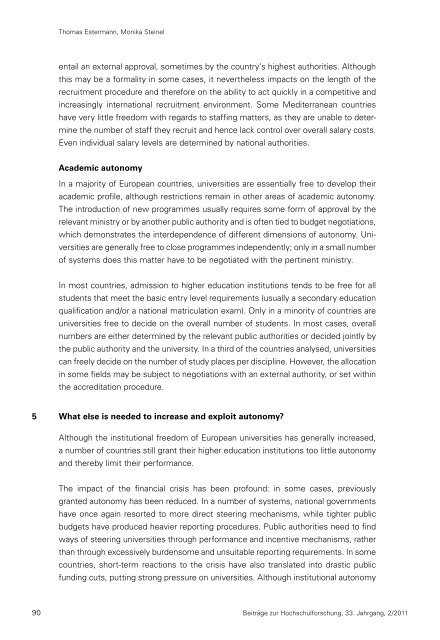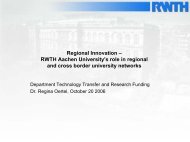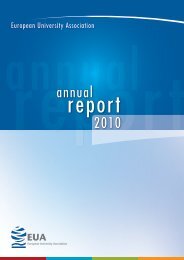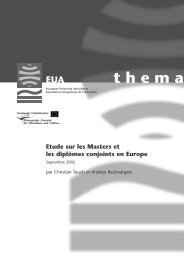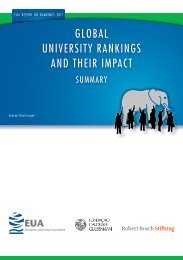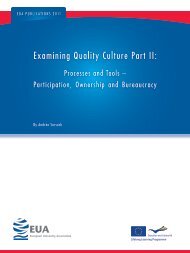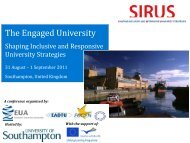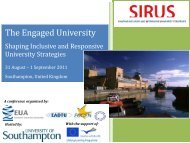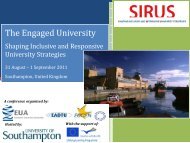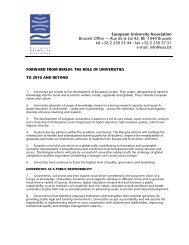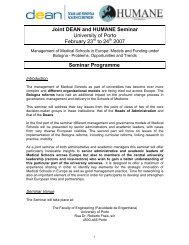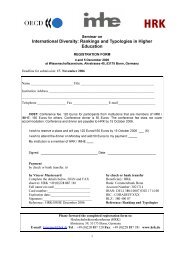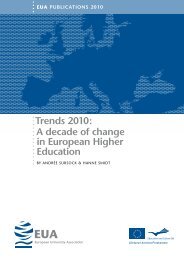Beiträge zur Hochschulforschung - European University Association
Beiträge zur Hochschulforschung - European University Association
Beiträge zur Hochschulforschung - European University Association
Create successful ePaper yourself
Turn your PDF publications into a flip-book with our unique Google optimized e-Paper software.
90<br />
Thomas Estermann, Monika Steinel<br />
entail an external approval, sometimes by the country’s highest authorities. Although<br />
this may be a formality in some cases, it nevertheless impacts on the length of the<br />
recruitment procedure and therefore on the ability to act quickly in a competitive and<br />
increasingly international recruitment environment. Some Mediterranean countries<br />
have very little freedom with regards to staffing matters, as they are unable to deter-<br />
mine the number of staff they recruit and hence lack control over overall salary costs.<br />
Even individual salary levels are determined by national authorities.<br />
Academic autonomy<br />
In a majority of <strong>European</strong> countries, universities are essentially free to develop their<br />
academic profile, although restrictions remain in other areas of academic autonomy.<br />
The introduction of new programmes usually requires some form of approval by the<br />
relevant ministry or by another public authority and is often tied to budget negotiations,<br />
which demonstrates the interdependence of different dimensions of autonomy. Uni-<br />
versities are generally free to close programmes independently; only in a small number<br />
of systems does this matter have to be negotiated with the pertinent ministry.<br />
In most countries, admission to higher education institutions tends to be free for all<br />
students that meet the basic entry level requirements (usually a secondary education<br />
qualification and/or a national matriculation exam). Only in a minority of countries are<br />
universities free to decide on the overall number of students. In most cases, overall<br />
numbers are either determined by the relevant public authorities or decided jointly by<br />
the public authority and the university. In a third of the countries analysed, universities<br />
can freely decide on the number of study places per discipline. However, the allocation<br />
in some fields may be subject to negotiations with an external authority, or set within<br />
the accreditation procedure.<br />
5 What else is needed to increase and exploit autonomy?<br />
Although the institutional freedom of <strong>European</strong> universities has generally increased,<br />
a number of countries still grant their higher education institutions too little autonomy<br />
and thereby limit their performance.<br />
The impact of the financial crisis has been profound: in some cases, previously<br />
granted autonomy has been reduced. In a number of systems, national governments<br />
have once again resorted to more direct steering mechanisms, while tighter public<br />
budgets have produced heavier reporting procedures. Public authorities need to find<br />
ways of steering universities through performance and incentive mechanisms, rather<br />
than through excessively burdensome and unsuitable reporting requirements. In some<br />
countries, short-term reactions to the crisis have also translated into drastic public<br />
funding cuts, putting strong pressure on universities. Although institutional autonomy<br />
<strong>Beiträge</strong> <strong>zur</strong> <strong>Hochschulforschung</strong>, 33. Jahrgang, 2/2011


